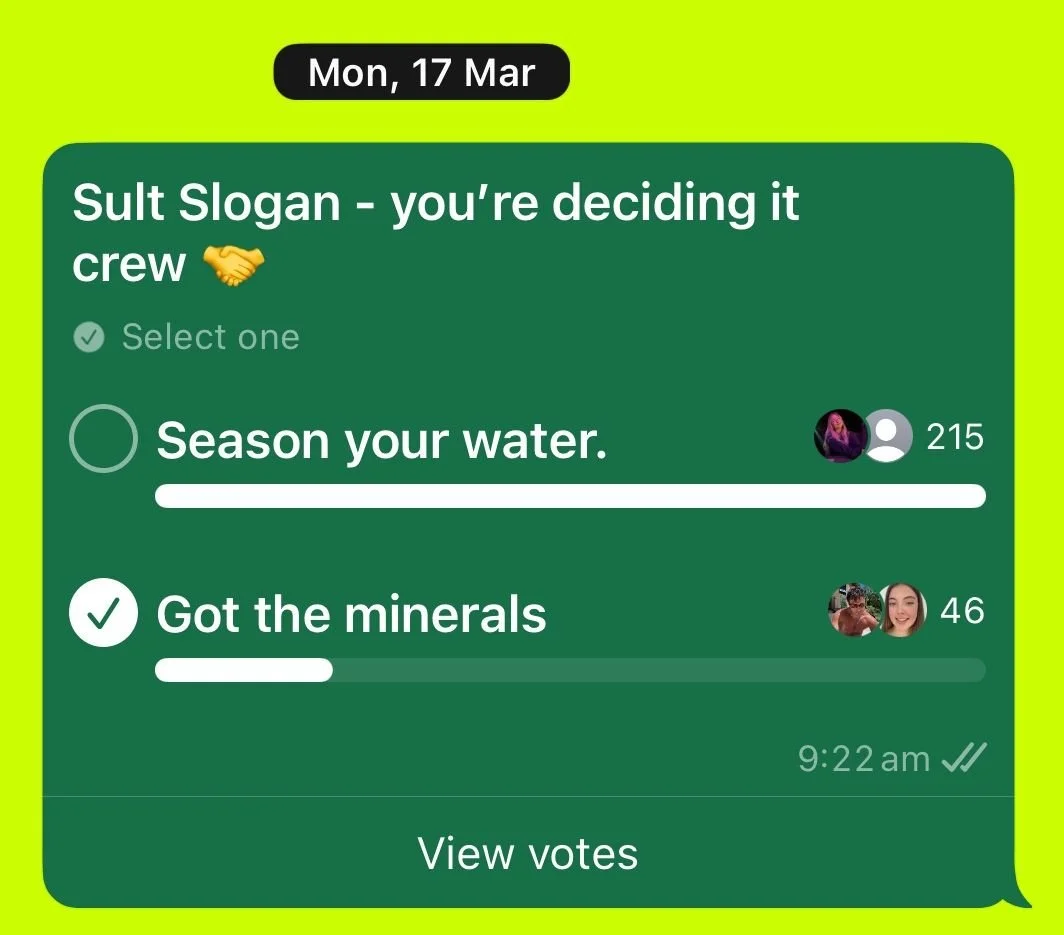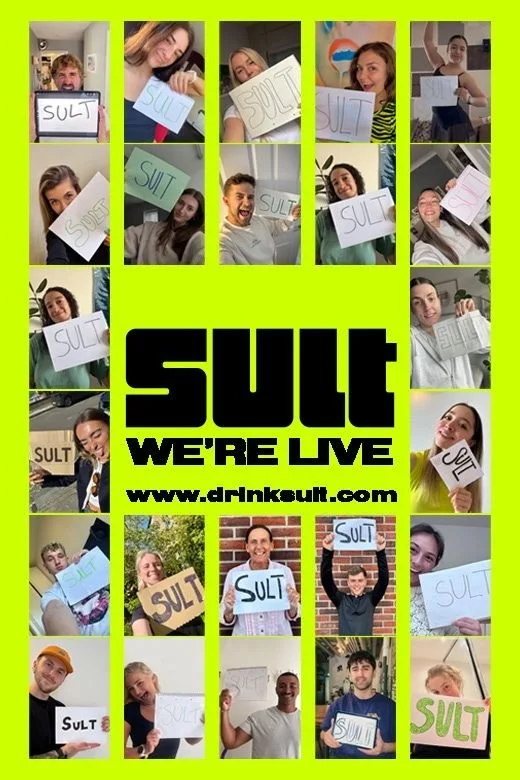how SULT let their community build their brand: an interview with SULT co-founder, Henry Porpora
In a wellness industry drowning in 5am wake-up calls and toxic productivity culture, SULT co-founders Milly and Henry had a radical idea: what if a brand just encouraged people to do their best without the burnout? What started as a mission to create better hydration has evolved into something much bigger - a masterclass in authentic community building that's reshaping how brands connect with their audiences.
With the hydration market more saturated than ever, SULT didn't just create another electrolyte drink. They built a movement by doing something revolutionary in today's polished social media landscape: they got real. Really real. From sharing production disasters to letting their community literally redesign their packaging, Henry and co-founder Milly have proven that transparency isn't just good marketing - it's the foundation of genuine human connection.
TLDR:
Ditch the hustle culture messaging: SULT positioned itself against toxic productivity culture by celebrating small wins like morning walks instead of pushing unsustainable 5am marathons, resonating with audiences tired of wellness brands that demand perfection.
Build in public with radical transparency: sharing everything from production wins to total disasters created authentic human connection in a polished market - people respond to realness over perfect branding, leading to customers treating the founders like mates rather than corporations.
Let your community co-create your brand: 60% of SULT's development came from community input, including a complete packaging redesign suggested by a LinkedIn stranger - this collaborative approach not only improved the product but saved money and created deeper brand loyalty.
Be yourself, not your boardroom self: the key to building genuine community isn't trying to impress anyone - it's being authentic in the way you'd act with friends, which cuts through the bullshit-detection skills modern consumers have developed.
Introduce us to SULT!
I'm Henry, co-founder of SULT. Simply put, SULT is a hydration brand that goes beyond just great ingredients and products.
We started SULT because I saw something lacking in the wellness space where hustle culture was really taking over. I'm really against that - I don't think it's healthy or sustainable. Our mission is to show people it's okay just to do the very best you can do. We're not pushing you to wake up at 5am to run a marathon. If you go for a walk in the morning, brilliant, well done! Just get up moving, without pushing beyond what's sustainable. We don't just tell that story - we show it. That's key.
Hydration is simple, it’s not just for athletes it's for all of us who live real lives - 9 to 5’s, workouts, nights out and recovery, that’s who SULT is for.
You've been "building in public" - sharing everything from production wins to total disasters! What made you go all-in on transparency?
People, more than ever, crave authenticity and genuine human connection. I think we've moved to a place where brands became really polished - perfectly color-graded content, bigger budgets - and in doing so, they lost that human connection and realness.
In an incredibly saturated hydration market, I needed something different. Everyone claims they have a better product, so I thought - as well as creating a genuinely insane product, let’s connect on a human-to-human basis too. That's how people buy these days.
The idea was simple: become humans rather than a brand. Show that it's just two people building something together. There's risk because you can get caught out, but that actually pushes you to be more authentic, not to lie. I've seen so many brands bullshit first-hand, and this approach keeps us accountable. People respond to that realness.
How has this personal touch changed the way people connect with SULT compared to more faceless corporate brands?
The best thing is, when you look at the DMs. People are like "hey Hen, hey Milly" - and know exactly who they're talking to. We always respond with "Hey, Hen here" or "Hey Milly here," and people speak to us like mates, never formal.
Even with emails now, when we're going through some weird problems with deliveries, we get messages like "Hey guys, my order hasn't arrived, just checking. All good, don't worry." If we were a faceless corporation, they'd be fuming with "WHERE IS MY ORDER?!" But because they feel like they’re in it with us, people are amazingly understanding.
I actually smile at the DMs every day. People wanting to chat, try the brand, and even aspiring founders reaching out for inspiration - it means so much. SULT isn't a brand to them - it's a mate, a friend, a WhatsApp group chat vibe, not a "I hope this finds you well" corporate brand.
That waitlist strategy before launch was awesome! How did you create so much FOMO pre-launch?
Milly and I took different roles in our pre-launch. I positioned myself as "I've just left this UK brand to build my own thing" and documented that journey. Meanwhile, Milly brilliantly became the authority in the space - while in Australia, she started posting about being obsessed with electrolytes and became London's "electrolyte girl." She'd casually ask her audience, "Seen any good electrolytes? Tried this one, didn't like it," getting them invested in finding the perfect product.
Eventually, we transitioned to "Hey, we're building a brand." People saw me as someone from wellness wanting to start something new, and Milly as someone who couldn't find a good electrolyte so was making one.
We documented everything - highs and lows - while finding ways to gamify it and create FOMO. We got people curious about our flavours, brand name, and look, while giving them ways to get involved.
About 60% of how we built SULT came from community input. We didn't plan it all out - we just doubled down on what worked. When people got obsessed with our packaging box, we made more content about it. You can't reverse engineer strategy when it comes to community or connection, it's a byproduct of authenticity.
How has this collaborative approach shaped your products, and were there any community suggestions that surprised you?
The community was something that I wanted to do because if I was involved in a brand's origin, I then feel more aligned with the brand itself. But the level of community involvement absolutely shocked me. We've reinvented how you can make something as basic as hydration exciting by getting people genuinely involved.
What's wild is how community feedback completely changed our direction sometimes. You share something you've spent hours on, and people straight-up tell you “Nah, it’s shit”- which is actually great! Most brands would launch with their original idea anyway, but we've launched with something that's been thoroughly tested. That's a huge win.
The box was a big shock. We posted four options for people to vote on, then I got a LinkedIn message from a guy saying, "Don't like any of these - here's a completely different design." It was brilliant!
I was like, 'What's your phone number?' and we hopped on a call for an hour and a half, and after that, we pretty much had the box finalised.
The community basically reshaped our entire brand in two days, which not only created something better but saved us a ton of money - me and Milly are annoyingly a little bit perfectionist with this stuff.
What about LinkedIn? Did that surprise you as a channel?
LinkedIn completely surprised us. The Perfect Ted team suggested we try it, so I posted there the next day. The engagement was way better than anticipated, so I did another post. Totally unexpected win.
For other founders looking to build a community-driven brand with serious stan energy, what's your number one piece of advice?
Just be yourself. I know it sounds cliché, but it's the only truly unique thing you can do. People are incredibly good at spotting bullshit nowadays.
As consumers, we want to understand who's behind a brand and why they're doing it - we check socials before buying anything. A few years ago, you'd just buy without thinking about it, but now we're hyper-aware of brand identity.
Building in public has been done a million times, so why is ours working? Because we don't try to be formal, or anyone that we’re not. We literally roast each other on social media. Be yourself in a way that's not trying to impress anyone - be you in front of your mates, not you in front of a boardroom. That's when you create real human connection.
SULT's journey proves that in our increasingly digital world, the most powerful marketing tool isn't a bigger budget or better algorithms - it's authenticity. By treating their audience like mates rather than metrics, they've created something rare: a brand that people genuinely care about.
The takeaway? Stop trying to be perfect and start being human. Your community doesn't want another polished corporation - they want to connect with real people building something they believe in. As Henry puts it, "be you in front of your mates, not you in front of a boardroom."
The future belongs to brands brave enough to show their human side. The question is: are you ready to get real?
Founder and Director @ Pretty
Little Marketer





